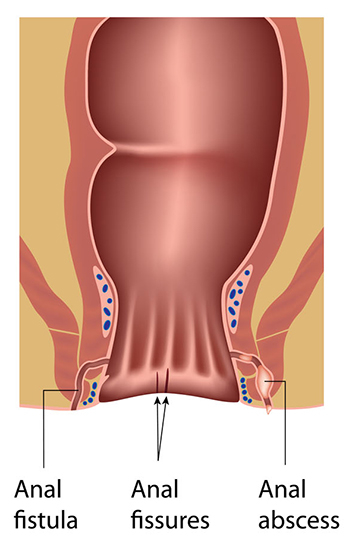Anal fissure
Key facts
- An anal fissure is a small tear or split in the skin that lines the anus.
- Anal fissures are very common and can occur in people of all ages.
- You should see your doctor if there is blood on your stool, on your toilet paper or you have pain when you are doing a poo.
- There are different treatment options for anal fissures.
- You can prevent anal fissures by eating high fibre foods, exercising regularly and drinking lots of water.
What is an anal fissure?
An anal fissure is a small tear or split in the skin that lines the anus. Your anus is the hole in your bottom through which faeces (poo) leaves your body.
Anal fissures are very common. They can occur in people of all ages.
If you have pain and discomfort when doing a bowel motion (poo) you might have an anal fissure.
An anal fissure can be very uncomfortable. But it will usually heal if you make some changes to your diet and follow some simple treatments.

What are the symptoms of an anal fissure?
If you have an anal fissure, you will have pain with defecating (pooing). This pain can last for up to 2 hours. The pain is due to:
- tearing of the anal fissure
- spasm of your anal sphincter muscle
You may also have some of the following symptoms:
- cramping around the anus
- blood on the stool (poo) or toilet paper after wiping your bottom
- itchiness around your anus
- a small crack or tear in the skin around the anus
- a small skin tag or lump near the anal fissure
CHECK YOUR SYMPTOMS — Use the Symptom Checker and find out if you need to seek medical help.
What causes an anal fissure?
Most anal fissures are caused by trauma (injury) to the area. This can happen:
- when you pass hard or large stools — for example, if you are constipated
- if you have diarrhoea
- during childbirth
Other, less common causes of anal fissures are:
- inflammatory bowel disease — especially Crohn's disease
- infection with tuberculosis
- sexually transmitted infections (STIs)
- cancer
When should I see my doctor?
You should see your doctor if:
- you have pain when you are doing a poo
- there is blood on your stool
- there is blood on your toilet paper
FIND A HEALTH SERVICE — The Service Finder can help you find doctors, pharmacies, hospitals and other health services.
How is an anal fissure diagnosed?
Your doctor will ask about your symptoms and examine your anus.
Your doctor may refer you to a colorectal surgeon if the cause of your symptoms is not clear, or your treatment isn't working.
How is an anal fissure treated?
There are 3 different approaches to treatment:
- conservative treatment
- medicines
- surgery
Conservative treatment
Most anal fissures will heal on their own. Conservative treatment aims to:
- reduce constipation
- relieve the pain
- heal the fissure
It involves eating lots of high-fibre foods and drinking lots of water to soften your stools (poos). Conservative treatment usually works in 6 to 8 weeks.
Your doctor may also recommend:
- a stool softener
- warm baths or sitz baths
These treatments are safe and have few side effects.
If needed, you can also use pain relief medicines.
This treatment works for more than 8 in 10 people with an anal fissure.
Medicines
There are some medicines that your doctor may prescribe to treat your anal fissure.
Your doctor may prescribe glyceryl nitrate (GTN) cream. However, this can cause side effects such as headaches and light-headedness. Speak with your doctor or pharmacists if you notice these or other side effects.
If GTN doesn't work, your doctor may prescribe a medicine called calcium channel blockers.
Botox is another treatment option. It's a chemical that's injected into the muscles around your anus to help them relax. It is recommended in people at high risk of developing faecal incontinence from surgery.
Botox usually lasts for 2 to 3 months. This allows the fissure to heal.
Surgery
Your doctor may recommend surgery if other treatments have not been helpful.
Anal fissure surgery is known as a lateral internal sphincterotomy. A small cut is made in your sphincter muscle, which relieves tension. You can have this procedure done as day surgery.
What are the complications of anal fissures?
In some people, the anal fissure can reoccur (come back).
In about 4 in 10 cases, anal fissures progress to become chronic (long term) fissures. If the split doesn't heal properly, it may cause a small ulcer to form.
Can anal fissures be prevented?
You can prevent anal fissures by eating a diet that's high in fibre. This can also help prevent your anal fissure from recurring (coming back).
You can also:
- exercise regularly
- drink lots of water
- not ignore the urge to poo — this can cause your poo to dry out and become harder to pass
Resources and support
You can also call the healthdirect helpline on 1800 022 222 (known as NURSE-ON-CALL in Victoria). A registered nurse is available to speak with 24 hours a day, 7 days a week.
Learn more here about the development and quality assurance of healthdirect content.
Last reviewed: June 2024











